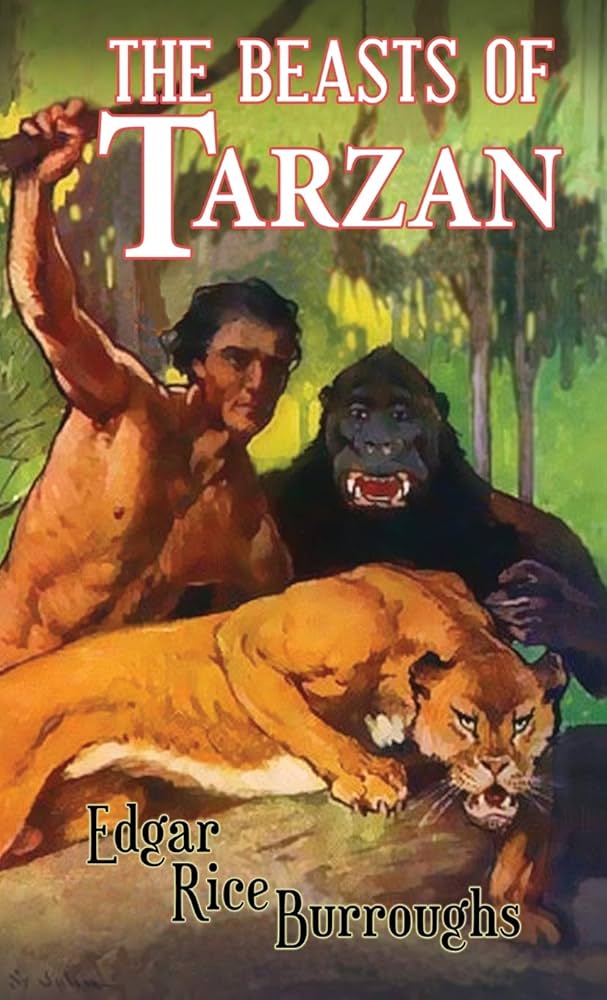Chapter 20 — The beasts of Tarzan
byChapter 20 – The beasts of Tarzan unfolds with growing desperation as Tarzan and his group remain marooned on Jungle Island. The focus turns to building a means of escape—a seaworthy vessel to return to civilization. This project, while essential, begins to test the unity and discipline of the group. Tarzan’s leadership is firm, yet cracks appear among the crew. Laziness, complaints, and veiled resistance rise, particularly from Kincaid’s men, who no longer conceal their reluctance to work. Jane’s safety becomes Tarzan’s foremost concern, especially as trust in their allies weakens. The lack of order and growing insubordination mirror the jungle’s unpredictability, reminding Tarzan that survival depends not just on strength, but on loyalty and focus.
Elsewhere on the island, the mutineers of the schooner Cowrie—Gust, Momulla, and Kai Shang—are entangled in their own chaos. They bicker over stolen pearls, revealing the greed and mistrust poisoning their alliance. Gust, calculating and cowardly, plants a false story about a warship spotted days earlier. He warns that its wireless could be listening, claiming they must remain hidden for a few more days. His lie is strategic—buying time so he can later escape with the Cowrie alone. The ruse succeeds temporarily, sowing doubt and hesitation among the others. However, his manipulation further divides the group, as tensions escalate and trust erodes. Jungle Island is no longer a mere trap—it has become a battleground of ambition and betrayal.
While Gust schemes, new alliances form. On a separate part of the island, two familiar faces—Schneider and Schmidt from the Kincaid—reappear. They encounter Momulla and quickly propose a self-serving plan: help them capture Jane in exchange for safe passage. Jane is no longer just a captive—she is viewed as leverage, a bargaining chip to secure freedom and fortune. Momulla, who sees opportunity in betrayal, agrees. Kai Shang, drawn by greed and practical need, also supports the plot. What follows is the beginning of a treacherous pact, one stitched together by fear, ambition, and mutual gain. With Jane at the center, the stakes are no longer about escape alone—they are about control.
Back at the beach, Gust’s paranoia turns real. He overhears Kai Shang and Momulla whispering about eliminating him once the ship is ready to sail. Despite being the only skilled navigator among them, Gust realizes his life is a liability. Panic grips him. His cleverness, which once bought him power, now paints a target on his back. Rather than confront them, he flees into the thick jungle, abandoning his post and his allies. The very wilderness he feared becomes his refuge. This sudden retreat disrupts the mutineers’ plan and introduces a new variable—one that could tilt the balance again. The jungle, silent and vast, hides him, but it also tests his endurance.
Gust’s flight marks a key turning point. His disappearance not only foils the villains’ timeline, but also demonstrates how disloyalty undoes even the strongest conspiracies. Without a navigator, the Cowrie becomes a floating prison rather than a means of escape. Panic begins to stir among Kai Shang’s group. Meanwhile, Tarzan, ever observant and attuned to the island’s rhythms, senses a shift in movement and tension. The jungle speaks in quiet signs—broken branches, odd silences, disturbed trails—and Tarzan listens. With Jane’s safety at risk and enemies regrouping, he prepares to take decisive action.
As factions fracture and betrayals deepen, the chapter sets the scene for confrontation. Jungle Island, once a place of exile, becomes a chessboard where every move carries life-or-death consequences. Tarzan remains the calm force at the center, but even he knows that wild instinct must now be matched with calculated strategy. The jungle has no patience for weakness, and Tarzan’s enemies have begun to unravel under their own treachery. This chapter bridges suspense with mounting conflict, drawing all characters closer to a climax that will test not only survival but the strength of every alliance, whether forged in fear or trust. In the end, it is not strength that wins—but clarity, courage, and the will to act before others do.

